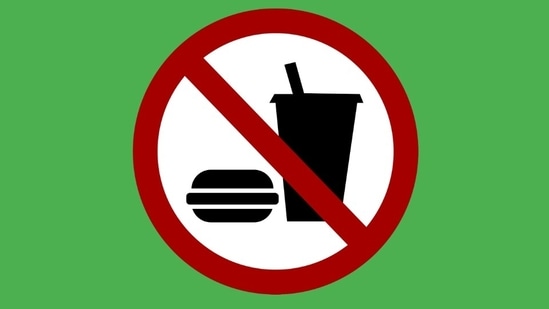It’s that time of year when married Hindus women prepare yourself for the day Fast But Festival Of Karva Chauthwhich will be celebrated India This year on 20th October. However, it is mandatory to consult a health expert before continuing the fast without any problem and doing what is right for your body. Fasting has long been acknowledged for its many health benefits, but it can also have negative effects on one’s health.

In an interview with HT Lifestyle, DT Varsha Krishna Gade, consultant-dietitian and nutritionist at Motherhood Hospitals, Pune, shared, “Unlike men, women face different hormonal changes due to fasting depending on the menstrual cycle and reproductive factors. Reactions may be experienced. Fasting can affect one’s menstrual cycle, causing periods to become irregular, periods to become longer or shorter, or even no periods to occur, it can affect luteinizing hormone and ovulation. Can, and it can trigger cortisol levels in the body. Therefore, women need to be careful while observing the fast of Karva Chauth. To stay healthy and avoid hormonal imbalance during fasting, it is mandatory to follow these important tips given in the article below.
He further said, “Karva Chauth is celebrated by women in which they keep fast for their husbands. This festival symbolizes the strong relationship between husband and wife. Dealing with the challenges of Karva Chauth fasting can be especially sensitive for women, given the possibility of hormonal disruption. Ensuring proper hydration before the fast begins is an effective strategy. It is mandatory to drink enough water while having morning meal (Sargi). Doing this can help maintain the balance of fluids in your body throughout the day. In turn, you will be able to reduce stress and prevent fatigue.

DT Varsha Krishna Gade further advised, “Including hydrating foods like cucumber and watermelon in your sargi can be beneficial. Sargi is an important ritual of this festival. You can also add nuts and seeds to it and make sure to eat them in the quantity recommended by your doctor. Be sure to choose citrus and protein-rich foods. To avoid hormonal imbalance, one should eat mindfully during Sargi. Do not include any oily food, eat foods that will provide you energy throughout the day. If you feel that fasting is affecting your health then it would be better not to fast. Women should avoid doing any strenuous work and instead do deep breathing exercises to stay calm as the fasting period can make them anxious and stressed. Choose sweets with natural sweeteners like honey and jaggery instead of refined sugar. Also, food should not be spicy to avoid acidity.”
Dr. Rajeshwari Panda, Head of the Department of Dietetics, Medicover Hospital, Kharghar, Navi Mumbai, lending her expertise said that fasting may be a spiritual practice, but it can also have an impact on women’s health, especially when it comes to hormonal balance. She comes. , He suggests some advanced tips to help you observe Karva Chauth vrat while minimizing potential hormonal disruptions –
Understanding Hormonal Balance:
- Hormonal Interplay: Hormones play an important role in various bodily functions, including the menstrual cycle, fertility, and overall well-being.
- Fasting and Hormones: Prolonged fasting can disrupt hormonal balance, especially in women who have underlying health conditions or irregular menstrual cycles.
Ways to reduce hormonal disruption:
1. Early preparation –
- Nutrient rich diet: Prioritize a nutrient-dense diet in the days leading up to the fast, focusing on complex carbohydrates, lean proteins, healthy fats, and abundant fruits and vegetables.
- Hydration: Stay well hydrated to maintain overall health and prevent dehydration-related hormonal imbalances.
2. Mindful Fasting –
- Listen to your body: Pay attention to your body’s signals. If you feel dizziness, weakness or other symptoms, break the fast immediately.
- Avoid strenuous activity: Limit intense physical activity during fasting to prevent excessive energy expenditure and possible hormonal fluctuations.
3. Nutrition after fasting –
- Serial Reproduction: Avoid eating too much immediately after breaking the fast. Reintroduce foods to your diet gradually to prevent sudden spikes in blood sugar levels.
- Nutrient Rich Food: Focus on foods rich in fiber, protein, and healthy fats to maintain hormonal balance and overall health.
4. Complementarity –
- Consult a dietitian: If you have concerns about hormonal balance, consider consulting a dietitian to discuss possible supplement options, such as B vitamins or magnesium, which may support hormonal function.
5. Chronic conditions –
- Personal Perspective: If you have underlying health conditions such as PCOS, thyroid disorders or diabetes, consult your healthcare provider for personalized fasting guidance.
6. Additional Considerations –
- Menstrual cycle: If you have a history of irregular menstrual cycles, consider discussing fasting with your healthcare provider, especially if you are trying to conceive.
- Long term fasting: While occasional fasting may be tolerable, frequent or prolonged fasting can have a significant impact on hormonal balance.
According to Dr. Anu Sadasiva B, consultant, reproductive medicine, obstetrics and gynecology at Milan Fertility Centre, Bengaluru, “Increased stress hormones, abnormal menstrual cycles and metabolic disruptions, brief changes in hormonal balance due to prolonged fasting etc. “Can result in.” , Keep in mind that women’s response to fasting varies depending on many factors, including age and underlying medical issues.

He cautioned, “Skipping meals for long periods of time can cause fluctuations in blood sugar levels, which can then lead to the release of the stress hormone cortisol. In addition, there is interference with reproductive hormones such as estrogen and progesterone whose imbalance can lead to mood swings, irregular menstrual cycles or fatigue. Therefore, women suffering from thyroid or PCOS (Polycystic Ovary Syndrome) should be especially careful, as these health problems are sensitive to dietary changes and fasting is likely to aggravate symptoms due to hormonal and metabolic imbalances.
Therefore, some precautionary steps can be taken, such as:
1. Keeping yourself hydrated. Drink adequate amount of water, electrolyte fluids before starting your fast, coconut water contains potassium and salt which can provide energy to your body quickly, and choose cucumber, fruits with high water content etc as they Can also help maintain cortisol levels and blood. Sugar level. Milk works as an excellent rehydrator.
2. Choose light meals rich in protein and healthy fats when breaking the fast, as these can help manage insulin sensitivity which prevents blood sugar levels from rising and smoothen hormonal regulations.
3. Choose slow-energy processing food like sargi that can help you feel full for longer.
4. Keep yourself stress free by doing some meditation, simple yoga postures, relaxation as these things can also maintain the cortisol and hormone levels.
5. Stay away from caffeinated drinks as they can trigger acidity or digestive problems, increase insulin levels, dehydrate you, harm your sleep, or sometimes cause nervousness, anxiety etc. Can cause, and each of them is connected to each other.
6. Prefer low sodium sargi or avoid salty or processed foods as they can deplete your water leaving you dehydrated and thirsty and tired. Also, avoid sweet foods as they can increase blood pressure.
7. Prefer to eat fruits as they contain fiber and water content so they are soluble and help prevent acid reflux. Therefore, start your meal with fruits to restore your energy.
8. Last but not least, check your blood sugar levels, do not ignore any reactive signs and symptoms.
By following these tips and working closely with your healthcare provider, you can minimize the potential hormonal disruptions associated with Karva Chauth fasting and enjoy the spiritual experience while prioritizing your overall health.
Disclaimer: This article is for informational purposes only and is not a substitute for professional medical advice. Always seek the advice of your doctor with any questions you may have about a medical condition.


